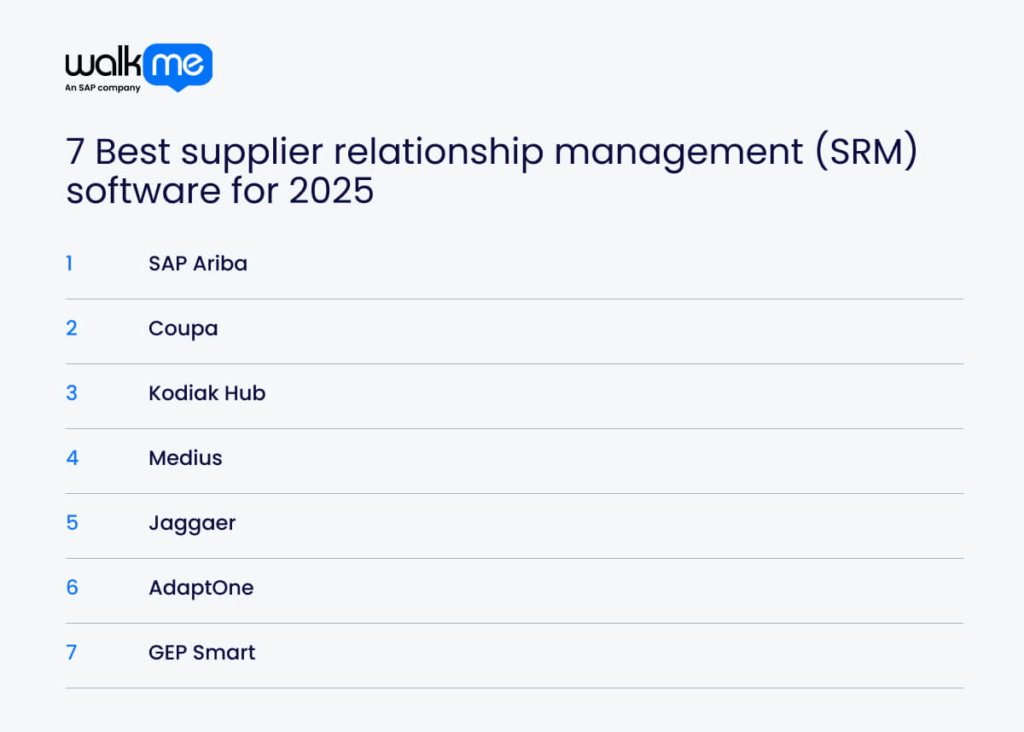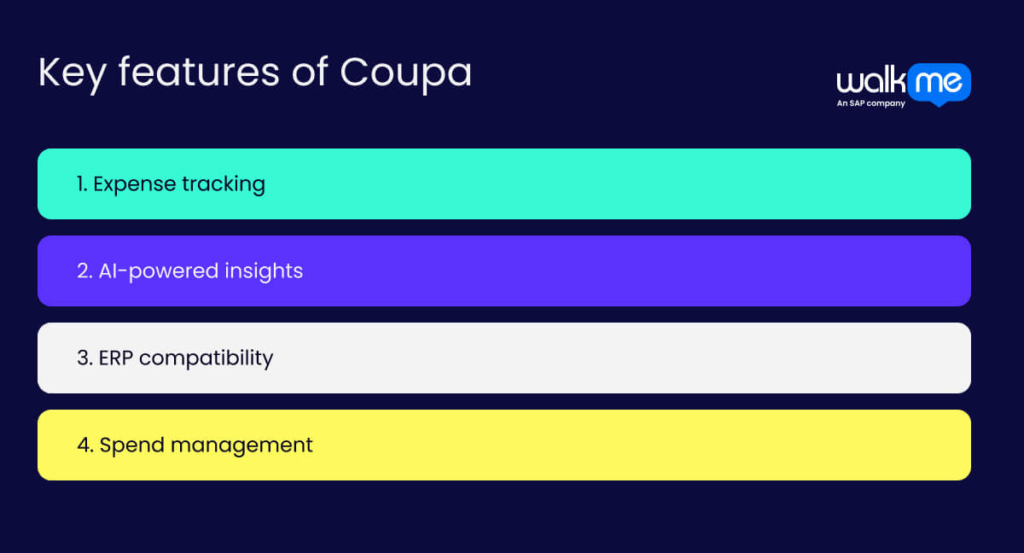Are your supplier relationships only focused on transactions? When there are data silos across different departments, it’s impossible to move beyond simple purchasing to build true strategic partnerships. You miss out on their valuable insights, leaving you constantly reacting to problems. This makes your supply chain management process fragile while competitors move ahead.
Instead, you need to adopt a supplier relationship management software that creates a shared platform for you and your suppliers to work as a cross-functional team. It allows you to set goals, track performance, and plan for the future together. This helps you build a more resilient supply chain and create long-term growth.
But the process of narrowing down your ideal supplier relationship management software can be complex. This article aims to make that easier by going through a list of eight tools that can build supplier relationships.

1. SAP Ariba
- Review Rating: 4.1/5
- Best For: Enterprises managing complex global supply chains.
SAP Ariba connects buyers and suppliers through its cloud-based solutions. It integrates procurement, sourcing, and supplier management into a seamless source-to-pay process. Businesses use SAP Ariba to automate procurement, control spending, and build better supply chains.
Suppliers benefit by accessing a global network, simplifying sales cycles, and improving cash flow. The platform provides tools such as guided buying, contract management, and spend analysis. Its integration with SAP Business Network also enhances collaboration and supply chain visibility.
Key Features
- Spend analysis: Advanced analytics to track and optimize spending across the organization.
- Supplier management: Tools to evaluate, onboard, and monitor supplier performance and risks.
- Dynamic discounting: Businesses can negotiate early payment discounts with suppliers through this tool.
- Procurement management: Comprehensive tools for managing procurement processes, including supplier collaboration.
2. Coupa
- Review Rating: 4.2/5
- Best For: Organizations seeking to simplify the management of spend and expenses.
Coupa is a supplier relationship management tool that helps companies manage all their spending. It brings the entire process of buying, handling bills, and making payments into a straightforward system. This gives businesses a clear picture of where their money is going.
By automating many daily tasks, Coupa saves time and reduces mistakes. It helps companies find ways to cut costs and save money. The platform also makes it easier to work with suppliers by providing a shared space for communication. This helps businesses follow their spending rules and avoid risks.

Key Features
- Expense tracking: Users can track and manage all business spending, so they always know where the money is going.
- AI-powered insights: Smart AI analyzes your spending to find hidden savings and suggests better ways to get things done.
- ERP compatibility: The system connects seamlessly with the business software you already use, such as Oracle and SAP.
- Spend management: A single, organized place to manage all your company’s spending, from employee expenses to paying supplier invoices.
3. Kodiak Hub
- Review Rating: 4.3/5
- Best For: Companies prioritizing supplier sustainability and risk management.
Kodiak Hub provides a cloud-based supplier relationship management (SRM) platform. You can use this system to reduce procurement risks and enhance supply chain resilience.
The platform automates supplier onboarding, risk assessments, and performance evaluations. With AI-driven insights, Kodiak Hub also helps businesses ensure ESG compliance and improve innovation with suppliers. By streamlining processes, Kodiak Hub reduces costs, improves supplier engagement, and drives sustainable procurement.
Key Features
- Track sustainability: Employees can keep an eye on their company’s sustainability goals, like reducing waste.
- Custom dashboards: You can create personal dashboards to see the business information that matters most to you.
- Supplier scorecards: Businesses can rate their suppliers on what’s important, such as the quality of their work and if they deliver on time.
4. Medius
- Review Rating: 4.4/5
- Best For: Small businesses automating accounts payable processes.
Medius Supplier Management is a cloud-based tool that simplifies how businesses manage suppliers and their data. By automating tasks such as onboarding and data updates, it saves time and reduces errors.
This tool ensures supplier information is always accurate, enabling businesses to make better procurement decisions. It also strengthens supplier relationships through clear communication and performance tracking. Medius also helps ensure suppliers meet required standards and certifications, improving compliance and reducing risks.
Key Features
- Handle bills automatically: Companies can process invoices and bills more quickly.
- Stop fraud: Leaders can catch and block fake or suspicious invoices, protecting the company from costly scams.
- Effortless matching: Employees can verify that invoices match their original purchase orders and receipts, ensuring they are paying the correct amount.
- Predict your cash needs: Businesses can get better forecasts of their upcoming payments, so that they can better manage cash flow.
5. Jaggaer
- Review Rating: 4.4/5
- Best For: Leaders needing advanced procurement analytics.
Jaggaer is a procurement platform that simplifies and automates the entire procure-to-pay process. It serves as a central hub, managing everything from identifying needs to making payments. For suppliers, it provides a secure and efficient way to connect with buyers, respond to sourcing events, and take part in purchasing activities.
The platform improves collaboration between buyers and suppliers, helping to build stronger relationships. It also reduces costs by automating tasks and optimizing digital workflows. With access to valuable data and insights, suppliers can make better business decisions. Jaggaer also ensures all transactions are secure and compliant with regulations.
Key Features
- Spending analysis: Businesses can get better insights from spending data to find new ways to save money.
- Organize by category: You can group your purchases into categories such as office supplies or software, to better manage supplier relationships for each one.
- Manage supplier risk: Users can check for potential problems with your suppliers, such as their financial health or past performance.
6. AdaptOne
- Review Rating: 4.7/5
- Best For: Organizations with highly specific compliance and supplier needs.
The AdaptOne supplier platform puts all your supplier information in one organized place. This makes it easier for your team can easily track everything from spending to performance.
The platform also helps protect your business by spotting potential risks early, like supply chain problems or suppliers not following the rules. It automates many routine tasks, which saves your team time and reduces manual work.
By making it easier to communicate and share information, AdaptOne helps you build better relationships with your suppliers.
Key Features
- Custom workflows: Companies can set up approval steps and processes to match exactly how their business works.
- Audit trails: You can keep a detailed history of all changes, making it easy to see who did what and when.
- Industry-specific modules: Employees can access special features designed just for an industry, whether it’s construction, government, or healthcare.
- Data consolidation: This system brings your supplier and purchasing data into one central spot.
7. GEP Smart
- Review Rating: 4.4/5
- Best For: Users who want a unified procurement and supply chain platform.
GEP Smart improves collaboration by giving suppliers a portal to update information and communicate with your team. This provides a clear, real-time view of their performance, helping you spot issues early.
This type of technology helps you save money by identifying cost-reduction opportunities and speeding up the sourcing process.
It also helps you manage risks by monitoring supplier financial health. As a cloud-native application, your team can access it from anywhere, allowing you to adapt quickly.
Key Features
- Contract management: Businesses can handle contracts in one place, from the day they are created until they end.
- Working with suppliers: A shared space for you and your suppliers to work together, exchange documents, and stay in touch.
- Inventory management: Users can keep track of stock in real-time, so they always know what they have and what they need to order.
- Future spending: This system provides predictions about your future spending to help you see what costs are coming and plan your budget.
How to choose the right supplier relationship management software for your enterprise
The ideal supplier relationship management (SRM) software can reduce a company’s risks and improve its profits. It can also create a better cross-functional team through better supplier relationships.
The table below lists what you need to consider when comparing the best supplier relationship management tools:
| Tool | Best For | Key Benefits | Industry Fit |
| SAP Ariba | Large enterprises | Comprehensive procurement and supplier management | Manufacturing, retail, and global supply chains |
| Kodiak Hub | Mid-sized businesses | Supplier relationship and sustainability tracking | Sustainability-focused industries |
| Coupa | Mid to large enterprises | Spend management, invoicing, and expense tracking | Finance, healthcare, and retail |
| Jaggaer | Large enterprises | Advanced procurement and spend analytics | Education, healthcare, and the public sector |
| Procure | Small to mid-sized businesses | Simple procurement and purchase order tracking | Small businesses and startups |
| Medius | Small to mid-sized businesses | Accounts payable automation and invoice processing | Small businesses and finance teams |
| AdaptOne | Enterprises needing tailored solutions | Compliance tracking and supplier management | Construction, government, and regulated industries |
| GEP Smart | Large enterprises | Unified procurement and supply chain management | Global enterprises and logistics |
Building stronger partnerships with the best supplier relationship management software
Supplier relationship management (SRM) software helps your business save money and manage risks. It helps you build stronger, more reliable partnerships with your suppliers.
Finding the right SRM software is important for creating these strong relationships. Look for a digital tool that can grow with your business and connect easily with the systems you already use.
Before you decide, schedule a demo to see how it works. It’s also a good idea to involve your purchasing, supply chain, and IT teams in the choice. Finally, test the software with a small group of suppliers to ensure it’s a good fit. Investing in the right SRM tool is a smart way to ensure your supply chain is successful for years to come.
FAQs
SRM software, or Supplier Relationship Management software, enables businesses to manage their suppliers more effectively. It focuses on building strong partnerships, not just handling basic transactions. This helps increase value, lower risks, and enhance the efficiency of the supply chain.
Supplier relationship management (SRM) software enables small businesses to save money, work more efficiently, and mitigate risks. It simplifies processes, enhances transparency, and fosters stronger supplier relationships. This helps small companies to improve their supply chain and stay competitive.
Setting up supplier relationship management (SRM) software can take a few weeks to several months. The time required depends on the system’s complexity, the number of suppliers involved, and the level of customization needed. Simple setups may be completed in weeks, while larger, more complex ones might take months.

